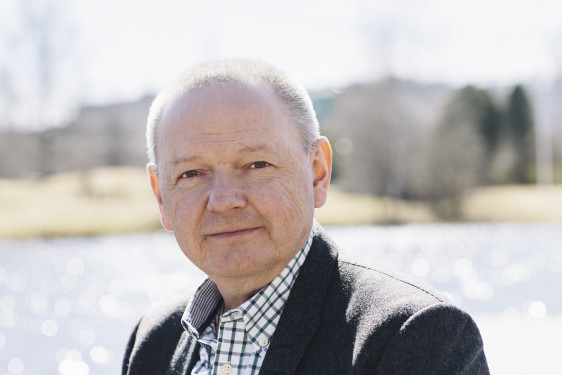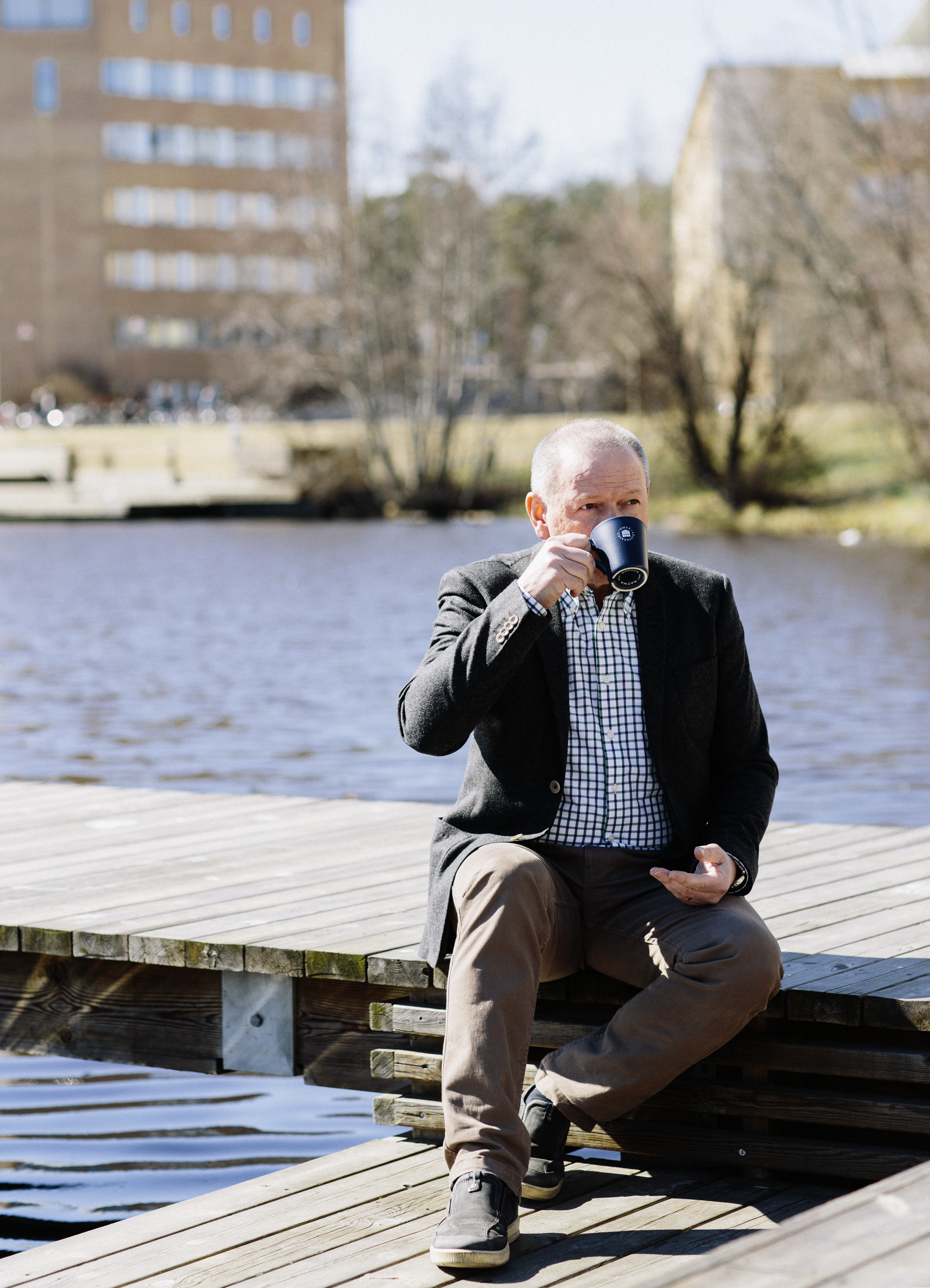NEWS On 1 July, Hans Adolfsson took over as Vice-Chancellor of Umeå University. To him, openness and collaboration is just as much a philosophy of life as part of a scientific method.

Summer 2015. Hans Adolfsson, Pro-Vice-Chancellor and professor of Organometallic Chemistry at Stockholm University, has travelled to Peru on holiday with his wife. Both are inveterate trekkers and they have spent many holidays on foot through the Swedish mountains, and in more remote mountainous regions such as the Dolomites and the Himalayas.
In Peru, they walk the Inca trail to the Machu Picchu ruins and travel around the country to experience the rain forest and other unique sceneries. But during their travels, Hans receives an email from Sweden, from a recruiting consultant.
“I answered that I was travelling, but promised to get in touch when I was back,” says Hans Adolfsson.
Back in Sweden, he called to find out what the fuss was about. He had been suggested as a Vice-Chancellor candidate for Umeå University.
“I’ve always thought fondly of Umeå University. So, I must say it felt interesting. I hesitated for about a week and a half, then I submitted my CV.”
The Vice-Chancellor of Stockholm University has been involved in the plans early on:
“I talked to Astrid Söderberg Widding about this going on right from the start. I like laying all cards on the table — maintaining transparency in processes and all of that,” says Hans Adolfsson.
‘Cards on the table’ and ‘transparency’ are something that Hans Adolfsson returns to several times during our conversation. It is a norm that seems to be dear to his heart. In that one might find a clue to why he has spent all of his working life in the realms of higher education as well.
“The strength of the academic sphere, as I see it, is the collegial influence. Being able to gain clear insight into what happens. I believe that many of those working within higher education find that there is much going on that they don’t find out about or they have clear insight into. But when it comes to most things, you are actually able to gain that insight — at least in my view.”
He would like to describe his nearly three years as Pro-Vice-Chancellor of Stockholm University as highly educational, and suggests that he would hardly have considered himself mature to shoulder the burdens as Vice-Chancellor without it:
“Being a part of a university management gave me heaps of experience. The perspective changes completely the second you climb a level from only seeing your own faculty. Not least the operations are more extrovert, from ministries and authorities to trade and industry, and society at large.”
“When the economy is stable and everyone strives in the right direction, it’s quite easy! But that’s never the case, is it?” says Hans Adolfsson with a smile.
Some of the responsibilities he has had to care for as Pro-Vice-Chancellor are collaboration, the teacher education and issues revolving around working environment and equal opportunities.
“Since I've been given responsibility for the teacher education, I have actually worked a great deal with Umeå University in a project where we have peer-reviewed each other’s teacher educations. The collaboration worked really well,” says Hans Adolfsson.
When it comes to organisation and control, his attitude is pragmatic: how it works is less important than the fact that it works. Working culture and climate is just as an important factor:
“Through the years, I have been at Umeå University a great deal at public defences of dissertations and similar events. And I’ve always experienced ‘a helluva buzz’ at the Department of Chemistry, if you’ll pardon my French. Good drive, open-minded, vivid discussions and there's a large shared common room where all faculty and staff can meet and talk — and they really do. It gives a very positive vibe.”

Hans Adolfsson was born in 1964 and was raised in a classical working family in Smedjebacken in mid-Swedish Dalarna. He really wanted to become a marine biologist, but his grades were not quite good enough for the Biology Programme at Stockholm University, which was his first choice. However, he was admitted to the Chemistry Programme.
“There was no tradition of studying in my family. I’m actually the first one to have completed university qualifications,” says Hans Adolfsson.
At the same time, he did not feel like an outsider:
“Educations in natural sciences are very including. The feeling of solidarity in the lab team makes it easy to join the academic world. I met my wife there, for instance, and we’ve stayed together ever since.”
His wife Lena Mäler is Head of the largest chemistry department at Stockholm University. And it will stay that way; a full-time move to Umeå is out of the question for her. But Hans Adolfsson is still looking forward to spending many future family weekends in Umeå.
“My wife was in Umeå at a public defence of a dissertation last autumn, at the time when fresh reindeer meat was available in food stores, which she bought and took home with her. It was incredibly tasty! I look forward to more of that.”
“I like good food, and good wine together. At home, we spend a fair bit of time in the kitchen where we try out new techniques. But it can have its drawbacks as well. I have to cut back a bit so I don’t grow too much around the waistline!” jokes Hans Adolfsson.
Much still points towards research and chemistry being his biggest passions, though. Even after his appointment as Pro-Vice-Chancellor, Hans Adolfsson has kept one foot in the department and has devoted 25 per cent of his time to research:
“At the moment, I have research Fridays — I try to be at the Department on Fridays and be Pro-Vice-Chancellor all other days. It doesn’t always work out, but I find that it’s important to still have a foot in the operations when you’re in a university management. I reckon I become a better leader if I’m also active within a research field,” he says and adds:
“There is another aspect as well — research really is so much fun.”
A defining moment for Hans Adolfsson was the end of the 1990s when he moved to California for a postdoc under the management of Chemistry Professor Barry Sharpless, a researcher who a few years later was awarded the Nobel Prize.
“In my mind, Barry Sharpless’ strength was an extremely open research climate in his team. It’s something I’ve tried to adopt in my own research,” he says.
“Something that Barry Sharpless often talked about was serendipity — the fortunate coincidence. Of course it was no coincidence that these important discoveries were made in his lab. But what was characteristic was how one made sure to capture interesting things that happened even when an experiment didn’t turn out as expected. Instead of throwing the chemical reaction in the bin and start again, you can take advantage of what doesn’t work and look for trends,” says Hans Adolfsson.
Even Stockholm University has a tradition of Nobel Prize winners in Chemistry: Four so far, from Svante Arrhenius in 1903 to Paul Crutzen in 1995. The fact that success should be something in the walls is not something Hans Adolfsson really falls for.
“Take the most successful American universities, for instance. They attract the best researchers thanks to their good reputation. But what a top researcher does is to recruit very proficient doctoral students and postdocs — and that’s where it happens. At least in the fields in which the Nobel Prize is awarded, the doctoral students and postdocs are the ones who actually make the discoveries.”
“This is a question I have thought a fair bit about when I’ve observed the University from the outside. Umeå University has been a good place for researchers to develop and grow, but it has lost too many. The aim should be for researchers to want to stay.”
He has an answer to everything, it seems. Straightforward, educational answers, at times with a Stockholm accent bordering on cocksureness — at other times his Darlecarlian heritage makes itself known. Hans Adolfsson’s version of that elusive concept called leadership, still seems to boil down to listening in the end.
“My plan is to be very active around our campuses and really go to our various departments and units — and I want to do it soon. I want to know where people actually spend their working days. I want to know what they do and what they’re good at. But also what challenges they see and what areas we could improve in.”
The tour will start as soon as people have returned from the summer holidays.
“It feels nice to start on 1 July as it gives me some time to settle in and get a first feel for things,” says Hans Adolfsson.
Age: 51 years.
Hobbies: Fishing, trekking, food and beverage. “My interest for wine is huge. As a doctoral student, I was actually chairperson of the wine tasting club at the Royal Institute of Technology (KTH).”
Reads: Cooking books and a varied selection of fiction.
Watches: Sport and sometimes sitcoms. “The science geeks in The Big Bang Theory are quite funny.”
Text: Jonas Lidström
Translation: Anna Lawrence
Photo: Elin Berge
Editor: Anna Lawrence